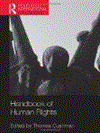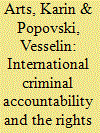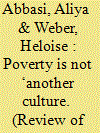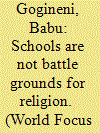|
|
|
Sort Order |
|
|
|
Items / Page
|
|
|
|
|
|
|
| Srl | Item |
| 1 |
ID:
129926


|
|
|
|
|
| Edition |
2nd ed.
|
| Publication |
Oxon, Routledge, 2012.
|
| Description |
xxiii, 744p.Hbk
|
| Standard Number |
9780415480239
|
|
|
|
|
|
|
|
|
|
|
|
Copies: C:1/I:0,R:1,Q:0
Circulation
| Accession# | Call# | Current Location | Status | Policy | Location |
| 057710 | 323/CUS 057710 | Main | On Shelf | Reference books | |
|
|
|
|
| 2 |
ID:
077553


|
|
|
|
|
| Publication |
Cambridge, Cambridge University Press, 2006.
|
| Description |
xiv, 191p.
|
| Standard Number |
9789067042277
|
|
|
|
|
|
|
|
|
|
|
|
Copies: C:1/I:0,R:0,Q:0
Circulation
| Accession# | Call# | Current Location | Status | Policy | Location |
| 052400 | 345.056/ART 052400 | Main | On Shelf | General | |
|
|
|
|
| 3 |
ID:
192314


|
|
|
|
|
| Summary/Abstract |
Well-being and protection of all children have widely been associated with universal rights. Simultaneously, though, there is growing advocacy for a right of children to work to live. Drawing on cultural relativist premises, such advocacy strongly correlates with an acceptance of poverty as a condition that is inevitable or simply ‘given’. We advance an argument against a right of children to work to live. The fact that only poor children are compelled to work should direct analyses to the causes of poverty. A critical engagement with the politics of development is necessary as it is often constitutive of relations of impoverishment. We critique Eurocentric perspectives that advocate for child labour and substantiate our argument by drawing on the case example of Bolivia, which lowered the legal age for child labour, only to eventually retract this decision. We demonstrate the link between neoliberal development and a rapid increase in the number of children forced to work to live since the 1980s. The case for a right of children to work to live is not justifiable; but there is a case for abolishing child labour and upholding the right of all children and their families to live in dignity. Poverty is not ‘another culture’.
|
|
|
|
|
|
|
|
|
|
|
|
|
|
|
|
| 4 |
ID:
184207


|
|
|
|
|
| Summary/Abstract |
In 1975, the world-famous novelist Yaşar Kemal (1923–2015) undertook a series of journalistic interviews with street children in Istanbul. The series, entitled “Children Are Human” (Çocuklar İnsandır), reflects the author's rebellious attitude as well as the revolutionary spirit of hope in the 1970s in Turkey. Kemal's ethnographic fieldwork with street children criticized the demotion of children to a less-than-human status when present among adults. He approached children's rights from a human rights angle, stressing the humanity of children and that children's rights are human rights. The methodological contribution of this research to the history of children and youth is its engagement with ethnography as historical source. His research provided children the opportunity to express their political subjectivities and their understanding of the major political questions of the time, specifically those of social justice, (in)equality, poverty, and ethnic violence encountered in their everyday interactions with politics in the country. Yaşar Kemal's fieldwork notes and transcribed interviews also bring to light immense injustices within an intersectional framework of age, class, ethnicity, and gender. The author emphasizes that children's political agency and their political protest is deeply rooted in their subordination and misery, but also in their dreams and hopes. Situating Yaşar Kemal's “Children Are Human” in the context of the 1970s in Turkey, I hope to contribute to childhood studies with regard to the political agency of children as well as to the history of public intellectuals and newspapers in Turkey and to progressive representations of urban marginalization.
|
|
|
|
|
|
|
|
|
|
|
|
|
|
|
|
| 5 |
ID:
130817


|
|
|
|
|
| Publication |
2014.
|
| Summary/Abstract |
l received recently a communication on Face Book that was rather disconcerting - it was typed in large font in Telugu, one of the Dravidian languages of South India. lt was shrieking that an unnamed school's authorities were considering suspension of a teacher as that teacher made students shout 'Jai Shri Raam' or 'Hail Lord Raama'.
Ø Can I not praise my Lord. Raama in my own country, it wails. I
Ø Was it Lord Raama or Jesus Christ that was born in India, it demands angrily.
Ø Does India belong to the Hindus or to the westerners, it asks mindlessly.
Ø Why should Hindu children sing Christian prayers, it asks with justi?cation.
I Pointing out that almost all Missionary schools in India ban girl pupils from wearing the bindi on the forehead and bangles on their hands, it asks for banning of such Christian Missionary Schools for violation of children's rights.
What is all this about? Lord Raama in Hindu mythology Lord Raama is one _of the l0 avatars or incarnations of Lord Vishnu. immensely important for the Hindus of North India, Raama is revered for his obedient ?lial morality, for his valiance as a warrior and for his rule as an ideal king.
|
|
|
|
|
|
|
|
|
|
|
|
|
|
|
|
|
|
|
|
|